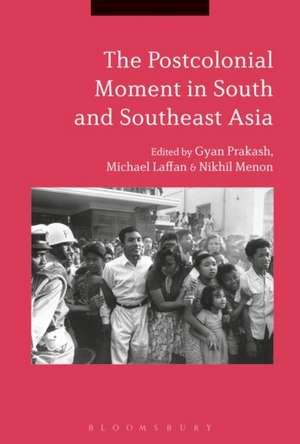The Postcolonial Moment in South and Southeast Asia
Editat de Professor Gyan Prakash, Nikhil Menon, Michael Laffanen Limba Engleză Paperback – 18 sep 2019
| Toate formatele și edițiile | Preț | Express |
|---|---|---|
| Paperback (1) | 232.63 lei 6-8 săpt. | |
| Bloomsbury Publishing – 18 sep 2019 | 232.63 lei 6-8 săpt. | |
| Hardback (1) | 716.96 lei 6-8 săpt. | |
| Bloomsbury Publishing – 21 feb 2018 | 716.96 lei 6-8 săpt. |
Preț: 232.63 lei
Preț vechi: 298.02 lei
-22% Nou
Puncte Express: 349
Preț estimativ în valută:
44.52€ • 46.31$ • 36.75£
44.52€ • 46.31$ • 36.75£
Carte tipărită la comandă
Livrare economică 15-29 aprilie
Preluare comenzi: 021 569.72.76
Specificații
ISBN-13: 9781350127760
ISBN-10: 1350127760
Pagini: 304
Dimensiuni: 156 x 234 x 15 mm
Greutate: 0.44 kg
Editura: Bloomsbury Publishing
Colecția Bloomsbury Academic
Locul publicării:London, United Kingdom
ISBN-10: 1350127760
Pagini: 304
Dimensiuni: 156 x 234 x 15 mm
Greutate: 0.44 kg
Editura: Bloomsbury Publishing
Colecția Bloomsbury Academic
Locul publicării:London, United Kingdom
Caracteristici
The contributors are a group of eminent scholars, each providing a unique take on a different angle of this complex subject
Notă biografică
Gyan Prakash is Dayton-Stockton Professor of History at Princeton University, USA. He is the author of Bonded Histories: Genealogies of Labor Servitude in Colonial India (1990), Another Reason: Science and the Imagination of Modern India (1999) and Mumbai Fables (2010). Michael Laffan is Professor of History at Princeton University, USA. He the author of Islamic Nationhood and Colonial Indonesia: The Umma Below the Winds (2003) and The Makings of Indonesian Islam: Orientalism and the Narration of a Sufi Past (2011), and the editor of Belonging Across the Bay of Bengal: Religious Rites, Colonial Migrations, National Rights (2017). Nikhil Menon is Assistant Professor of History at the University of Notre Dame, USA.
Cuprins
IntroductionFragility1. "False Truth": Decolonization, Disillusionment and Hope in the 1950s - Rotem Halperin Geva (Hebrew University of Jerusalem, Israel)2. The Enemy Within: Communism and the new Pakistani State - Kamran Asdar Ali (University of Texas, USA)3. Contested Meanings of Post-colonialism and Independence in Burma - Mandy Sadan (School of Oriental and African Studies, UK)4. The Marginal State: Practicing Islamic Statehood in Independent Indonesia - Chiara Formichi (Cornell University, USA)Mobility and Turmoil5. Taming of the Custodian: Evacuee Property Law and Economic Life in the Indian Republic - Rohit De (Yale University, USA)6. Struggles for Citizenship around the Bay of Bengal - Sunil Amrith (Harvard University, USA)7. Genealogies of Return: Postwar, Tamil Culture and the Bay of Bengal - Bhavani Raman (University of Toronto, Canada)Anxiety and Agency 8. Anxious Constitution-Making - Gyan Prakash (Princeton University, USA)9. Forging India's Democratic Citizenship: The Making of Universal Franchise in the Postcolonial Moment - Ornit Shani (University of Haifa, Israel)10. 'Towards Mass Education or a "Natural Aristocracy of Talents"?': Manpower Needs and the Virtues of 'Non-Alignment' - Neeti Nair (University of Virginia, USA)Pedagogy11. 'The Work of Independence': Land Reform and the Ethical Imagination in Postcolonial India - Benjamin Siegel (Boston University, USA)12. 'Help the Plan - Help Yourself': Making India Plan-Conscious - Nikhil Menon (University of Notre Dame, USA)13. The Past and Future of the Muslim Post-Colonial Moment: Islamic Economy and Social Justice in South Asia - Julia Stephens (Rutgers University, USA)14. Straight from Mecca: Medan, Hamka and the Coming of Islam to Indonesia - Michael Laffan (Princeton University, USA)
Recenzii
[A] welcome addition to the emerging scholarship on history of the postcolonial period. Therefore, I strongly recommend this as essential reading for young scholars, students, and anyone interested in understanding the current political and social climate of the new South and Southeast Asian nation states that emerged in the middle of the twentieth century.
This large collection of excellent essays on decades of transition from empire to nation in southern Asia is particularly valuable today when retrograde nationalist demogogues feed so freely on crudely simplified stereotypes of national identity and historical experience. This wonderfully creative work should stimulate more serious scholarship exploring the questions left open here: did the "post-colonial moment" ever end?
Delving beyond the rhetoric of post-colonialism, this important book traces the practical way societies in South and South East Asia built institutions in the wake of empire's end. It draws from an impressive range of local archives to show what citizens of Asia's independent states did to transcend the colonial condition they'd been subject to until World War II. In a series of elegantly-written essays, it's distinguished authors trace the sense of restlessness and novelty, but also the fragility and violence which shaped the beginning of democracy in South and South East Asia. This is an essential book which founds the comparative study of post-colonial history in South and South East Asia.
This large collection of excellent essays on decades of transition from empire to nation in southern Asia is particularly valuable today when retrograde nationalist demogogues feed so freely on crudely simplified stereotypes of national identity and historical experience. This wonderfully creative work should stimulate more serious scholarship exploring the questions left open here: did the "post-colonial moment" ever end?
Delving beyond the rhetoric of post-colonialism, this important book traces the practical way societies in South and South East Asia built institutions in the wake of empire's end. It draws from an impressive range of local archives to show what citizens of Asia's independent states did to transcend the colonial condition they'd been subject to until World War II. In a series of elegantly-written essays, it's distinguished authors trace the sense of restlessness and novelty, but also the fragility and violence which shaped the beginning of democracy in South and South East Asia. This is an essential book which founds the comparative study of post-colonial history in South and South East Asia.
